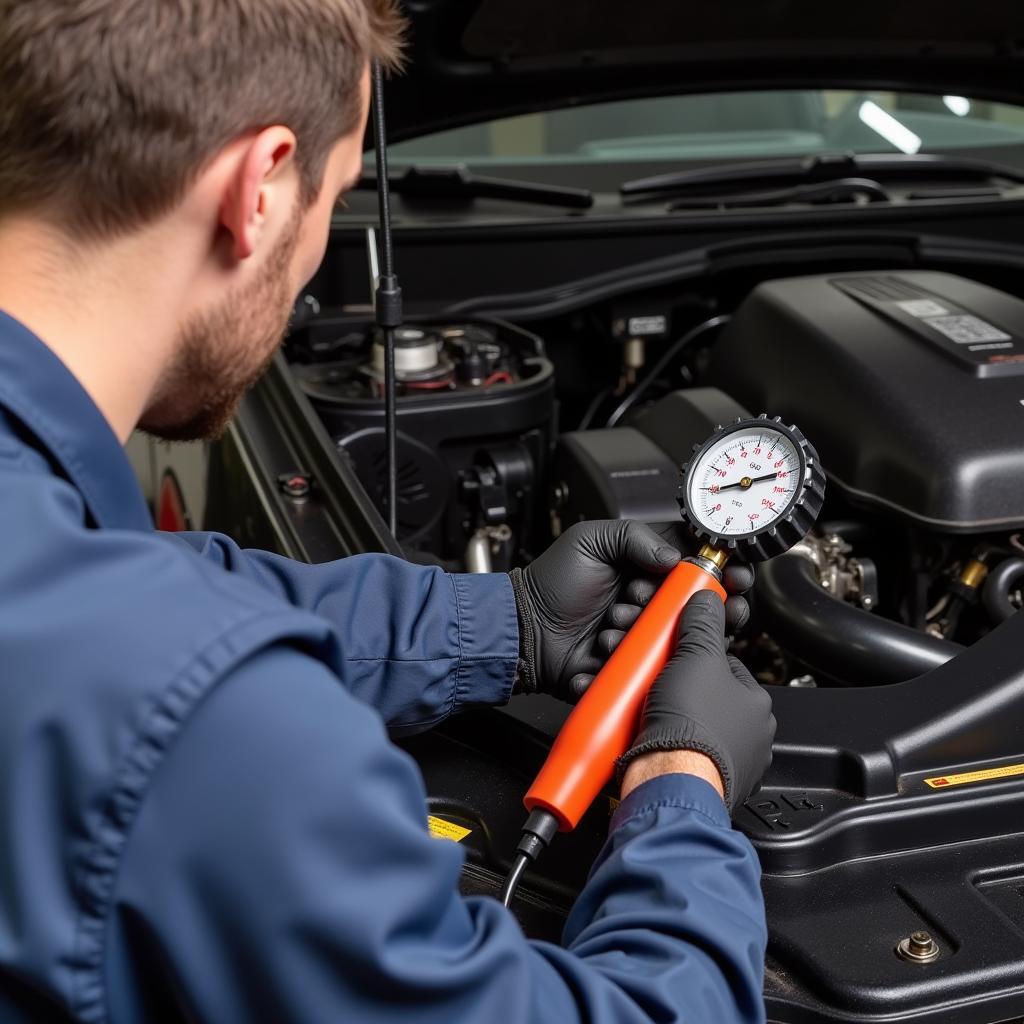Can Flex Seal Fix A Car Radiator? It’s a common question for car owners facing a leaky radiator. While Flex Seal is marketed as a powerful sealant, its effectiveness on car radiators is a complex issue. A leaking radiator can quickly lead to overheating and engine damage, making a quick fix tempting. However, understanding the nature of radiator leaks and the properties of Flex Seal is crucial before attempting a repair.
Understanding Radiator Leaks
Radiator leaks can range from small pinholes to larger cracks, often caused by corrosion, vibration, or impact. The radiator operates under high pressure and temperature, making it a challenging environment for any sealant. Locating the leak is the first step. Look for signs of coolant dripping, staining, or even steam. Sometimes a pressure test is necessary to pinpoint the exact location.
 Identifying a Radiator Leak
Identifying a Radiator Leak
Types of Radiator Leaks
Different leak types require different solutions. A small pinhole leak might be temporarily sealed with a stop-leak product, but a larger crack often requires professional repair or replacement. Ignoring a leak, no matter how small, can lead to significant engine problems down the road.
Can Flex Seal Actually Work on a Radiator?
Flex Seal is a rubberized sealant that forms a waterproof barrier. While it can adhere to various surfaces, its effectiveness on a hot, pressurized radiator is debatable. The high temperatures can cause the sealant to soften and lose its grip, potentially leading to further leaks. Moreover, Flex Seal can clog the delicate radiator fins, restricting coolant flow and reducing cooling efficiency.
Risks of Using Flex Seal on Your Radiator
While a temporary fix might seem appealing, using Flex Seal on your radiator carries risks. The sealant can break loose and circulate within the cooling system, potentially blocking coolant passages and causing overheating. In the long run, this can lead to costly repairs. “Flex Seal can be a band-aid solution in emergency situations,” says John Miller, a veteran automotive technician with 25 years of experience. “But it’s not a long-term fix for a radiator leak.”
Alternatives to Flex Seal for Radiator Repair
Several alternatives offer a more reliable solution for radiator repair. Specialized radiator sealants designed to withstand high temperatures and pressure are available. These products are formulated to seal leaks without clogging the cooling system. For more significant damage, professional radiator repair or replacement is the recommended course of action. “Addressing the root cause of the leak is crucial,” adds Sarah Chen, a mechanical engineer specializing in automotive cooling systems. “A proper repair ensures the longevity and efficiency of your vehicle’s cooling system.”
Long-Term Radiator Maintenance
Preventing radiator leaks is the best approach. Regular coolant flushes, checking for leaks, and addressing minor issues promptly can save you from costly repairs down the line. “Preventative maintenance is key to a healthy cooling system,” Miller emphasizes. “Regular checks can identify potential problems before they escalate.”
Conclusion: Can Flex Seal Fix a Car Radiator? The Verdict
While Flex Seal might offer a temporary fix in a dire situation, it’s not a recommended solution for radiator repair. The risks associated with its use outweigh the potential benefits. Specialized radiator sealants, professional repair, or replacement offer more reliable and long-lasting solutions. Remember, a well-maintained cooling system is essential for the health of your engine. For personalized advice and assistance with your car’s cooling system, connect with us at AutoTipPro. Call us at +1 (641) 206-8880 or visit our office at 500 N St Mary’s St, San Antonio, TX 78205, United States.
FAQ
-
What are the signs of a radiator leak?
Common signs include coolant puddles under the car, overheating, low coolant levels, and a sweet smell. -
How much does it cost to fix a radiator leak?
The cost depends on the severity of the leak and whether repair or replacement is necessary. It can range from a few dollars for a sealant to several hundred for a new radiator. -
Can I drive with a leaking radiator?
Driving with a leaking radiator can cause severe engine damage. It’s best to address the issue immediately. -
How long does a radiator repair take?
Repair time varies depending on the damage. Minor repairs can take a few hours, while a radiator replacement can take a full day. -
How often should I flush my radiator?
It’s recommended to flush your radiator according to your vehicle’s manufacturer specifications, typically every two to five years or 30,000 to 60,000 miles. -
What causes a radiator to leak?
Common causes include corrosion, vibration, impact, and age. -
Can I fix a radiator leak myself?
Minor leaks can sometimes be addressed with specialized sealants, but significant damage often requires professional repair.




Leave a Reply